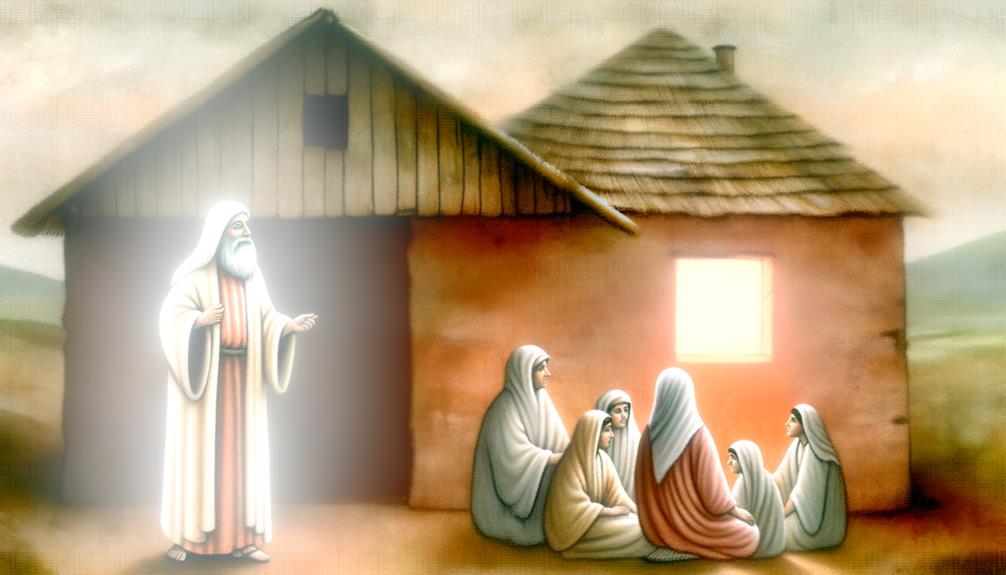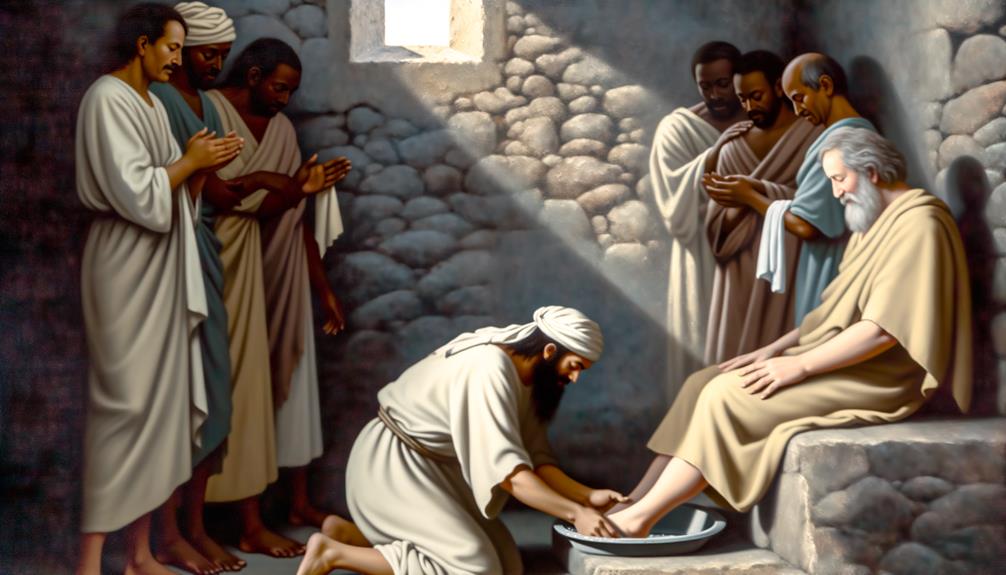Head of the Household Meaning Bible: Leadership
The concept of the ‘head of the household‘ in the Bible encompasses both theological doctrines and ancient cultural practices, typically assigning this role to a male figure. This responsibility includes spiritual guidance, moral leadership, and family protection.
In the Old Scripture, patriarchs like Abraham demonstrated these roles (Genesis 18:19). The New Scripture redefines headship through the model of Christ, emphasizing servant leadership and humility (Ephesians 5:23).
Balancing authority with wisdom, the head is tasked to nurture family members spiritually (Ephesians 6:4). Exploring further will reveal nuanced interpretations and modern applications of these biblical principles.

Head of the Household Meaning in the Bible: Spiritual and Leadership Insights
| Aspect | Biblical Insight |
|---|---|
| Definition | The head of the household is seen as the spiritual and moral leader of the family. |
| Key Scripture | Ephesians 5:23 – “For the husband is the head of the wife as Christ is the head of the church.” |
| Responsibilities | Providing, protecting, and guiding the family in faith and moral living. |
| Spiritual Role | Leading the family in prayer, worship, and adherence to God’s Word. |
| Gender Context | Traditionally male role, but modern interpretations consider shared leadership. |
| Leadership Style | Modeled after Christ—loving, sacrificial, and servant-hearted. |
| Purpose | To create a godly, stable, and spiritually nurturing household. |
Biblical Origins

In the context of biblical literature, the concept of the ‘head of the household‘ is deeply rooted in theological doctrines and ancient cultural practices.
Scripturally, this role is often ascribed to the male figure, reflecting a patriarchal structure prevalent in both Old and New Scriptures times.
The head of the household was not merely a figure of authority but also bore spiritual and moral responsibilities.
This position required guiding the family in religious observance, ethical behavior, and communal duties.
The theological underpinnings suggest that the head of the household served as a mediator between God and the family unit, embodying principles of stewardship, leadership, and covenantal faithfulness.
Such a role was integral to maintaining the spiritual integrity of the household.
Old Testament Insights

The Old Scripture provides foundational insights into the concept of the head of the household, particularly through its patriarchal family structure.
This structure underscores the roles of leadership and responsibility, as exemplified by figures such as Abraham and Moses.
Scriptural narratives consistently emphasize the head of the household’s duty to guide, protect, and provide for the family, aligning with broader theological principles of stewardship and covenantal leadership.
Patriarchal Family Structure
Scriptural exegesis of the Old Scriptures reveals a deeply entrenched patriarchal family structure, where the male head of the household holds significant authority and responsibility. The patriarch’s role extends beyond mere governance, encapsulating spiritual guidance and moral leadership.
This structure is evident in various biblical narratives and laws, underscoring the importance of male leadership within the familial unit. For instance:
| Aspect | Description |
|---|---|
| Authority | Male figures dictate family decisions |
| Inheritance | Property and blessings passed through males |
| Protection | Males guarantee family safety and security |
| Religious Duties | Priestly roles often reserved for men |
This table highlights the multifaceted roles of patriarchs, evoking the gravity and solemnity of their responsibilities within the biblical context.
Leadership and Responsibility
Numerous passages in the Old Scripture illustrate the profound leadership and responsibility vested in the male head of the household, highlighting his pivotal role in guiding his family in accordance with divine mandates.
For instance, Genesis 18:19 emphasizes Abraham’s duty to command his children and household to keep the way of the Lord through righteousness and justice.
Similarly, Deuteronomy 6:6-7 mandates fathers to diligently teach God’s commandments to their children.
This patriarchal responsibility underscores a broader theological framework where the head of the household is seen as a spiritual leader, accountable for the moral and religious education of his family.
Consequently, the Old Covenant portrays the household head as a custodian of faith, entrusted with upholding and transmitting divine principles.
New Testament Perspectives

The New Covenant reconceptualizes the notion of headship within the household, positioning Christ as the ultimate head and exemplar.
Ephesians 5:23 underscores this by likening the husband’s role to that of Christ, emphasizing a model of servant leadership characterized by love and sacrifice.
This paradigm shift challenges traditional hierarchies, advocating for a leadership style grounded in humility and service.
Christ as Household Head
In the New Covenant, Christ’s role as the head of the household is profoundly illustrated through His leadership, teachings, and sacrificial love for the church.
Ephesians 5:23 explicitly states, ‘For the husband is the head of the wife even as Christ is the head of the church, his body, and is himself its Savior.’ This passage underscores Christ’s authority and responsibility in guiding the spiritual well-being of His followers.
Additionally, Colossians 1:18 emphasizes, ‘And he is the head of the body, the church,’ reiterating His supremacy.
Christ’s headship is characterized by a model of divine leadership that prioritizes humility, guidance, and self-giving love, setting a paradigmatic example for all Christian households.
Servant Leadership Model
A central tenet of the New Covenant’s portrayal of leadership is the concept of servant leadership, as epitomized by Jesus Christ. In John 13:14-15, Jesus washes the disciples’ feet, illustrating that true leadership involves humility and service.
This model is further expounded in Mark 10:42-45, where Jesus asserts that greatness is found in serving others, not in exercising authority. The Apostle Paul echoes this sentiment in Philippians 2:5-7, describing Christ’s self-emptying nature.
Hence, the New Scripture redefines the head of the household not as a dominator but as a servant-leader, who uplifts and nurtures those under their care. This paradigm shift challenges traditional hierarchical views, advocating for a leadership style rooted in love and sacrifice.
Authority and Responsibility

Understanding the balance of authority and responsibility within the concept of the head of the household is essential to thoroughly grasping its implications in both familial and societal contexts.
Biblically, the head of the household is vested with a divine mandate to lead, as delineated in Ephesians 5:23: ‘For the husband is the head of the wife as Christ is the head of the church.’
This authority, however, is inherently tied to a profound sense of responsibility. The head must govern with wisdom and justice, embodying Christ-like sacrificial love.
Consequently, scriptural authority is not an avenue for dominance but a call to righteous stewardship, ensuring the well-being and spiritual growth of all household members.
Servitude in Leadership

Servitude in leadership, as exemplified by the head of the household, calls for a selfless commitment to the welfare and spiritual nourishment of the family, mirroring Christ’s humility and service.
Ephesians 5:25 emphasizes this model, urging husbands to love their wives ‘just as Christ loved the church and gave Himself up for her.’ This scriptural mandate underscores the sacrificial nature of true leadership.
Service, rather than dominance, becomes the cornerstone, reflecting Jesus’ teaching in Mark 10:45: ‘For even the Son of Man did not come to be served, but to serve, and to give His life as a ransom for many.’
Consequently, biblical headship integrates authority with the profound responsibility of nurturing and uplifting one’s household in faith and love.
Role of Fathers

Building on the principle of servitude in leadership, the role of fathers within the household encompasses not only provision and protection but also the spiritual guidance and moral development of their children.
Scriptural texts emphasize the father’s duty to nurture a faith-filled environment, ensuring that biblical teachings are woven into daily life. Fathers are called to emulate Christ’s love, fostering an atmosphere of grace and integrity.
- Ephesians 6:4: Fathers are instructed to bring up children in the discipline and instruction of the Lord.
- Proverbs 22:6: Highlights the importance of training a child in the way they should go.
- Colossians 3:21: Warns fathers not to provoke their children, to avoid discouragement.
Role of Mothers

Mothers play a pivotal role in the familial structure, tasked with nurturing, teaching, and exemplifying godly virtues to their children.
Scripturally, they are depicted as pillars of wisdom and guidance, integral in shaping the moral and spiritual foundation of the household. Proverbs 31 extols the virtues of a godly mother, highlighting her industriousness and spiritual fortitude.
| Aspect | Scriptural Reference |
|---|---|
| Nurturing Role | Isaiah 66:13 |
| Teaching Virtues | Proverbs 1:8-9 |
| Exemplifying Faith | 2 Timothy 1:5 |
Mothers are entrusted with fostering an environment where faith flourishes, and values are instilled. Their influence is profound, shaping the character and spiritual trajectory of the next generation, thereby fulfilling a divine mandate within the home.
Modern Interpretations

In contemporary contexts, the concept of the ‘head of the household’ has evolved, reflecting broader societal changes and shifting family dynamics.
Modern interpretations often emphasize egalitarian principles, recognizing the diverse roles within a family unit. This shift is influenced by a variety of factors:
- Cultural Shifts: Increased advocacy for gender equality has reshaped traditional views on leadership and authority in the household.
- Economic Factors: Dual-income families necessitate shared responsibilities and decision-making.
- Scriptural Reinterpretations: Contemporary theologians often reexamine Biblical texts to support mutual respect and cooperation between spouses.
Such reinterpretations foster a more inclusive understanding of familial leadership.
Practical Applications

To effectively implement modern interpretations of the ‘head of the household,’ practical applications must address the distribution of responsibilities, decision-making processes, and conflict resolution strategies within the family unit.
Scripturally, Ephesians 5:21-33 emphasizes mutual submission and love, suggesting that leadership should embody humility and service. Responsibilities can be distributed based on individual strengths and capacities, fostering a cooperative environment.
Decision-making should involve open dialogue, prayer, and collective discernment, aligning with Proverbs 15:22 that extols the value of counsel.
Conflict resolution necessitates a Christ-centered approach, emphasizing forgiveness and reconciliation as instructed in Matthew 18:15-17.
These principles, when applied, create a harmonious family structure that honors biblical teachings while adapting to contemporary contexts.
Conclusion
The concept of the head of the household, deeply rooted in biblical texts, reflects a blend of authority, responsibility, and servitude.
Drawing from both Old and New Scriptures teachings, it underscores a leadership model that is sacrificial, emulating Christ’s love for the Church.
The roles of fathers and mothers are delineated, yet complementary, fostering a harmonious family structure.
Modern interpretations continue to evolve, yet the scriptural foundation remains a guiding beacon for contemporary application.






